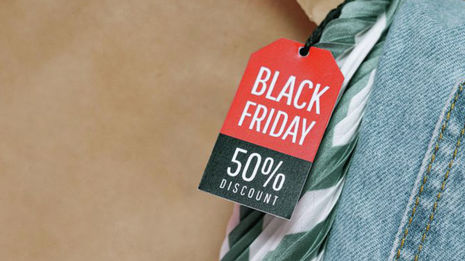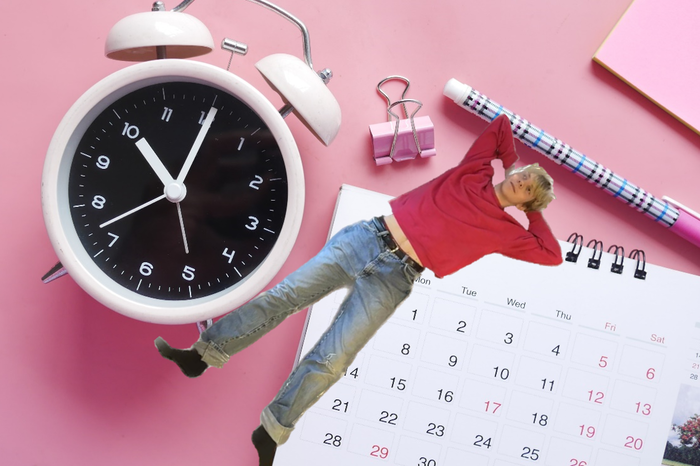Can deinfluencing save us from Black Friday?
Jude Browning explores the TikTok phenomena’s ability to tame our rampant spending habits

The seminal, artful 2009 romcom ‘Confessions of a Shopaholic’ begins with the shopping addict Rebecca Bloomwood spotting an alluring green scarf on a mannequin. She immediately tells herself “Rebecca you just got a credit card bill of 900 dollars, you do not need a scarf.” Upon this moment, the mannequin jumps to life and beckons her to spend on the rather pedestrian looking garment; “The scarf would become a part of a definition of your psyche, it would make your eyes look bigger.” She says back “it would make my haircut more expensive,” rationalising her over expenditure.
A similar mental gymnastics competition occurs nationwide in the United Kingdom on Black Friday, with discounts beckoning us like a noughties CGI mannequin to spend. An import from the United States, Black Friday has now become a staple event in the UK, a holiday without even the pretense of spiritual warmth, just unashamed consumerism. At least with Christmas companies pretend that offering ten percent off an OLED TV is what Dickens really wanted Victorian Britain to embrace. One saving grace in the UK is that we have, for now, avoided the unedifying spectacle of a species that has flown to the moon brawling in a Walmart over shoes. Although perhaps this is expected in the UK where research has found discounts exist in name only. And let us not ignore that discounts are presented as savings, as if buying a reduced item somehow accounts towards a financial surplus. Akin to the way in which Liz Truss’ premiership being shorter than a season of Love Island saved this nation billions.
“A holiday without even the pretense of spiritual warmth, just unashamed consumerism”
But there are deeper questions to answer about the celebration of consumerism as we become more aware of its environmental impact. The North Atlantic Garbage Patch, soon to be twinned with the United Kingdom, grows ever larger as the packing our purchases are smothered in are thrown aside. TikTok seemed as though it provided an answer, perhaps the first societal good to come out of the app, through ‘deinfluencing.’ The trend consists of people, often former shopaholics themselves, duetting videos of products being advertised and reminding us that most ‘must haves’ are definitive ‘live withouts.’ A noble task, however much as the contradictions in Austria-Hungary provided irreconcilable; a new trend immediately appeared as if the TikTok immune system was shocked by the intrusion of a non-harmless trend into its body. Recently, restocking influencers have become increasingly popular on the app, where they move products bought in thin plastic containers in the supermarket into thicker reusable plastic containers in their kitchen. All the aesthetics of a zero-waste lifestyle with twice the waste. Sadly, TikTok is not the radical anti-capitalist bastion we had hoped and the further introduction of the TikTok shop makes purchasing increasingly convenient.
“Sadly, TikTok is not the radical anti-capitalist bastion we had hoped”
Decreasing our consumption as humans has never seemed harder. The ‘reduce’ in ‘reduce, reuse, recycle’ is treated as a washed-out relic of an era before micro fashion trends (“Are you a clean girl or a coastal grandma?”). Even some of the martyrs of Just Stop Oil, in between ensuring Van Gogh pays for his environmental crimes, have been exposed for racking up thousands of air miles in foreign holidays. There is a genuine space for self-expression through the clothes you wear and the ornaments in your room, but where does this mindless consumerism end? Deinfluencing has genuinely good intentions, but is it a substitute for using less and relearning how to make and fix our own things?

Procrastination: How to make time for time-wasting
So, is deinfluencing the knight in shining armour we need to fend off the Black Friday madness? It’s certainly a start. The notion of an influencer trying to not sell us a product constitutes a cultural turn. But let’s be real, it’s like using a band-aid on a broken leg. To truly escape the curse of Black Friday’s buy-buy-buy spell, we need more than just a few videos breaking up a steady stream of consumerist content. It’s about changing the whole game – learning to use what we already have, fixing stuff instead of chucking it, and not getting sucked into every new trend. In the grand scheme of things, deinfluencing is just the beginning. The real deal? It’s about making ‘less is ok’ our new mantra and sticking to it, even when those flashy sale signs try to lure us in.
 News / Cambridge academics sign open letter criticising research funding changes22 February 2026
News / Cambridge academics sign open letter criticising research funding changes22 February 2026 News / University Council rescinds University Centre membership20 February 2026
News / University Council rescinds University Centre membership20 February 2026 News / Supporters protest potential vet school closure22 February 2026
News / Supporters protest potential vet school closure22 February 2026 News / Hundreds of Cambridge academics demand vote on fate of vet course20 February 2026
News / Hundreds of Cambridge academics demand vote on fate of vet course20 February 2026 Comment / A tongue-in-cheek petition for gowned exams at Cambridge 21 February 2026
Comment / A tongue-in-cheek petition for gowned exams at Cambridge 21 February 2026








